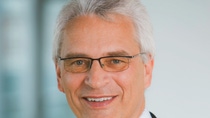Chi siamo
Employees want a total package

Dr. Wolfgang Hapke is President of Human Resources at BASF. Here he talks about trends in human resources. His view: Life-long learning makes us – both companies and employees – more successful.
Creating Chemistry: Before becoming head of Human Resources, you were responsible for BASF’s engineering plastics business. Where do you see the biggest challenges in your new position?
Dr. Wolfgang Hapke: For me, it is the responsibility of reconciling the ambitions and expectations of more than 110,000 employees with social influences and the needs of our business units. From my own experience, I know how important it is for human resources and operating divisions to work closely together. I see my task as ensuring that new demands from the operations side of our business are implemented quickly in our personnel activities. This enables us to support our employees in their day-to-day work. And by the same token, we try to recognize human resources trends at an early stage and integrate these in our work. This allows us to offer good service to the business units in the long term. The two most important trends, in my opinion, are employee development and life-long learning.

Dr. Wolfgang Hapke
President of Human Resources at BASF
Dr. Wolfgang Hapke has been head of the Human Resources Competence Center of the BASF Group since March 2013 and is responsible for BASF’s personnel work worldwide. During his career, he has worked in the United States and Hong Kong, where he was responsible for BASF’s division Market and Business Development, Asia Pacific.
You have spent several years working in the United States and in Hong Kong. Have you noticed any differences in professional development and learning?
People are different in different regions – and yet they have much in common. The need to constantly develop and improve our skills is something we all share. However, there are significant differences between us in terms of how we learn, how quickly we learn and what we learn. For example, take a look at Asia’s emerging markets: People there have a very strong desire to catch up to the West as quickly as possible, so they are incredibly keen and willing to learn. People in China are mainly interested in the technology of the future. Almost nobody there is familiar with the old-style tube televisions, for example, but they do know all about the latest technologies. In relation to human resources work, this means that we need to find the right way to integrate important global topics and implement them in the environment specific to each culture and country.
Could you give us an example? How does an international company combine regional and global aspects in its personnel strategy?
BASF has a global strategy. Based on this, we have developed our Best Team Strategy. It sets out the most important human resources topics for the coming years: excellent people, an excellent place to work and excellent leaders. This will improve our leadership culture. That is our global framework. There are some topics at BASF where we want a uniform approach across the Group. Leadership, for example, is one of them: In a global competency model, we describe the behaviors that we expect from our employees and managers. For other topics, the local companies can fill in the details of the framework. In other words: We want to provide attractive offerings for our employees worldwide, including compensation, benefits and a working environment that is oriented towards the employees’ stages of life and focuses on their personal development. Every company then tailors these offerings to the locally prevailing conditions.
Why, in your opinion, does life-long learning play such a key role?
People who continue learning throughout their lives are simply more successful. The same is true for companies. For us, it is important to be prepared for constant change and keep our employees fit. This is why we offer learning opportunities to employees – throughout their entire career. We are also introducing a new global concept for employee development. The key to this concept is that employees and managers share responsibility for the individual development steps and measures. Employees who help shape their own personal development are more motivated and better performers. Our Learning Campus demonstrates how we implement our life-long learning offerings at BASF. It is a learning platform that combines global opportunities for further training with regional offers, enabling employees to create their very own personalized learning program. In this way, we support their personal and career development. At the same time, we are doing something beneficial for our business because we have integrated the goals of our corporate strategy into the learning programs. This helps us prepare our employees for the challenges they will face in ten or 20 years’ time.
What does a company have to offer its employees these days?
Money alone is certainly not sufficient. Employees today want a compelling total package: interesting responsibilities, personal development and a work environment that is both flexible and stable. Furthermore, we are finding it is becoming more important to achieve better work-life management. At our largest site in Ludwigshafen, Germany, we are currently building a new Center for Work-Life Management – including a day care center, social counseling and a fitness studio, all under one roof. But there is more to work-life management as well, for example, flexible working hours and a management culture that allows that. As you can see, life-long learning is also essential in human resources work.


